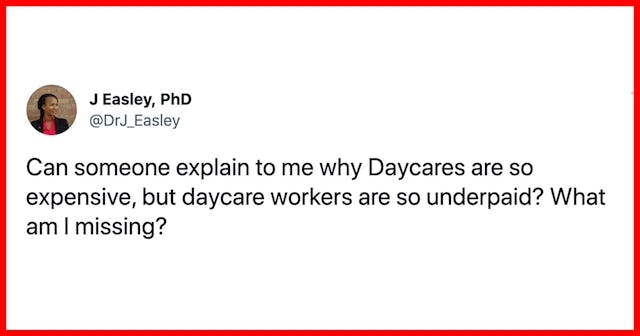Why Is Daycare So Freaking Expensive, Yet Its Workers Still Underpaid?

Not long ago, I stumbled across a Twitter thread that had begun with a single question: “Can someone explain to me why Daycares are so expensive, but daycare workers are so underpaid? What am I missing?”
In a subsequent tweet, user @DrJ_Easley noted that her parents run a small, in-home daycare, and that her question arose because there was a “huge gap” between what her parents charge and what she pays “down here” in GA. (I assume her parents’ daycare must be farther north.)
I remember bristling at the cost of the childcare facility my son went to when he was little and I first started working. It was hard to believe we were paying almost as much as our mortgage — about half my take-home pay at the time — for someone to watch our two-year-old.
I wasn’t the only one with sticker shock. Across the United States, child care tuition is often a household’s first- or second-biggest expense, competing with mortgage or rent. Yet daycare workers and early childhood are paid very little. According to the Center for American Progress, nearly 40% of daycare workers have to resort to using public assistance at some point. But the center itself is typically functioning on a tight budget. (The link above, if you want to get into specific scenarios, will take you to an interactive that uses national averages and local data to determine state-specific cost estimates for early childhood care for a particular area.)
Why is early childhood education so freaking expensive? And why aren’t its workers paid more?
I expected a pile-on against daycare providers in response to that tweet I saw, but the comments were mostly voicing the practical concerns of the cost to run a daycare.
“Imagine parents and child care workers paid identical hourly rates,” user @SPWeston said. “If a worker cares for four children, that person needs 1/4 of a parent’s pay per child. Plus FICA. Plus benefits. Plus a room with utilities and equipment and supplies and food. Plus someone to keep the books.”
“Just do the math,” user @KiraboJackson wrote. “In many states you can have 3 staff per 10 infants. At $200 per week per child for 45 weeks, that’s 90,000 per year. Even assuming no rent or overhead that’s 30k per staff member. You can mess around with these numbers, but the basic math tells the story.
Back when I was reeling with sticker shock at the cost of my own kid’s care, I did a similar bit of math in my head and arrived at the same conclusion. Yes, we were paying almost as much as our mortgage just so my son had a safe place to go while I worked. But the truth was, the workers who so lovingly cared for my son weren’t making much, and neither really was the owner of the facility.
Note that the quick math in @KiraboJackson’s tweet above assumes an even three-way split of $90,000. That number doesn’t include any overhead whatsoever — no mortgage, liability insurance, electricity, water, gas, internet, phone, building maintenance, bookkeeper, food, cleaning supplies, room decor, etc.
Daycare owners are not typically rolling in money. The people they employ definitely aren’t. Of course, that’s not to say there isn’t ever any price-gouging or employee abuse. Obviously anyone running any kind of company can become greedy and corrupt and take advantage of people or inflate prices and claim “elite” status.
So, what is the answer?
svetikd/Getty
The answer is that, like other services that are critical to the functioning of society, like the farming of our food and the educating of our children and the construction of our roads, early childhood education should be subsidized by public funds. Yes — with tax dollars. For all our bluster about how important it is to give children the best start possible in life, and for all our praise of early childhood educators, we sure aren’t putting our money where our mouths are.
We expect highly trained professionals to care for our children and prepare them for kindergarten, and that’s a fair request. Every child deserves quality care. However, the flip-side of that is that these teachers need to be paid in a manner commensurate with their supposed value. The only way to do that and still keep childcare affordable for parents is to subsidize this service.
As much as “fiscal conservatives” may whine about raising taxes to fund a service that people can in theory choose to opt out of, the truth is, funding quality early childcare with tax dollars would improve our overall economic and social well-being. Young children who get a quality early childhood education do better later on in just about every metric from their physical health to their self-esteem.
Parents who can afford to put their kids in daycare are parents able to earn an income, able to afford preventative healthcare, able to contribute to the economy with the everyday purchases they’re able to make thanks to being able to work. Funding early childhood education with public dollars would not be an expense — it would be an investment.
So, yes, daycare is freaking expensive. And, no, daycare workers aren’t paid enough. But it’s generally not the daycare we should be pointing our fingers at and wondering why they’re charging so much. It’s ourselves we should be looking at. Our representatives. We need to be asking why it is that we collectively have not been willing to make this investment in our children. And what we can do to change that.